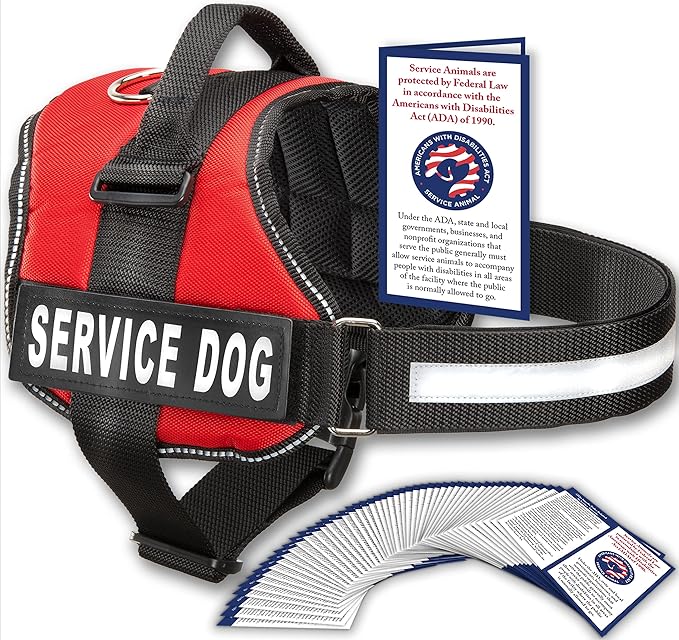Service Dog Certification Guide – Empower Your Furry Friend!
Are you ready to embark on an incredible journey with your furry companion?
For individuals with disabilities, service dogs are more than just pets – they’re superheroes in fur coats! Highly trained assistants that provide invaluable support and enhance independence. Whether it’s guiding individuals with visual impairments, alerting to the onset of medical conditions, or providing stability and assistance with mobility, service dogs play a crucial role in improving the quality of life for their handlers. If you’re considering getting your service dog certification, you’ve come to the right place. In this blog post, we’ll guide you through the process of obtaining certification for your service animal, empowering you to navigate the journey with confidence and clarity.

Here are some common reasons why someone might want to register their dog as a service animal:
- Assistance with Disabilities
Service dogs are trained to perform specific tasks that assist individuals with disabilities in carrying out daily activities. For example, service dogs can provide mobility assistance for people with physical disabilities, alert individuals with hearing impairments to sounds, or provide support for individuals with psychiatric or neurological conditions. - Increased Independence
For individuals with disabilities, having a service dog can enhance independence and autonomy by enabling them to perform tasks more easily and with greater confidence. Service dogs can help mitigate the effects of disabilities and reduce reliance on human assistance. - Emotional Support
Service dogs not only perform practical tasks but also offer emotional support and companionship to their handlers. The presence of a trained service dog can provide comfort, alleviate anxiety, and improve overall well-being for individuals dealing with various physical or mental health challenges. - Access to Public Spaces
Service animals are granted legal protections under disability rights laws, allowing them to accompany their handlers in public places where pets are typically not allowed. Registering a dog as a service animal can help ensure access to public spaces such as restaurants, stores, hospitals, and transportation services. - Accommodation Requests
Registering a service dog can facilitate accommodation requests in various settings, including housing, workplaces, and educational institutions. Landlords, employers, and school officials are often required to make reasonable accommodations for individuals with disabilities who rely on service animals. - Travel Assistance
Service animals are typically allowed to accompany their handlers in the cabin of airplanes at no additional charge. Registering a service dog can help streamline the process of traveling with the dog and ensure compliance with airline regulations. - Legal Protection
Registering a service dog can provide legal documentation and identification that confirms the dog’s status as a trained service animal. This documentation can help prevent misunderstandings or conflicts when accessing public places or asserting rights under disability laws.
It’s important to note that registration alone does not confer service animal status. To qualify as a service animal, a dog must be trained to perform specific tasks that mitigate the effects of a person’s disability. Additionally, registration services that require payment may not be necessary or recognized by legal authorities. It’s advisable to work with a reputable service dog organization or trainer to ensure that your dog receives appropriate training and certification.

Steps to take when getting your service dog certification:
- Understanding the Role of Service Animals
Before embarking on the certification process, it’s essential to understand the role and responsibilities of service animals. Service animals are trained to help people with disabilities by performing specific tasks. These tasks are tailored to the individual needs of their handlers and are intended to enhance independence, accessibility, and overall well-being. - Identifying Eligibility Criteria
Not all animals are suited to become service animals, and not all individuals with disabilities require one. To qualify for certification, your pet must be capable of performing specific tasks that directly assist with your disability. Additionally, you must have a documented disability recognized under disability rights laws to be eligible for certification. - Choosing the Right Training Program
The key to obtaining certification for your service animal lies in comprehensive training. Enroll your pet in a reputable service dog training program or work with a certified trainer experienced in service animal training. Training programs typically cover essential skills such as obedience, task training, public access training, and socialization. - Documenting Training and Skills
Keep detailed records of your service animal’s training progress, including the tasks they have mastered and their performance in various environments. Documentation may include training logs, videos, and evaluations from certified trainers. These records will serve as valuable evidence of your service animal’s capabilities when seeking certification. - Obtaining Certification Documentation
While there is no official certification or registry for service animals recognized by the government, many organizations offer certification documentation and identification cards for service animals. Look for reputable organizations that adhere to industry standards and provide thorough evaluations of your service animal’s training and skills.
Obtaining certification for your service animal is a journey that requires dedication, patience, and commitment and can have transformative benefits for individuals living with disabilities. From personalized assistance and increased independence to emotional support and enhanced accessibility, service dogs play an indispensable role in improving the lives of their handlers. By recognizing the invaluable contributions of these specially trained companions and advocating for their rights, we can create a more inclusive and compassionate society where individuals of all abilities can thrive. Together, you and your certified service animal can embark on a journey of independence and empowerment.
Dog Training
Check out our article Dog Training: Mastering Bark Control – A Comprehensive Guide to Training Collars and Barking Behavior
- Disclosure: This blog contains affiliate links. If you decide to make a purchase through these links, I’ll receive a commission at no extra expense to you. ↩︎

